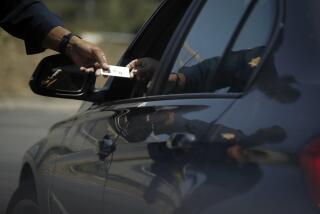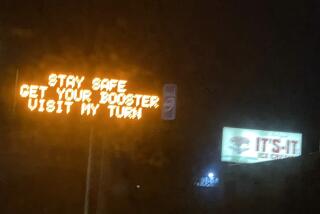Phone rangers: Rule enforcement will vary
With the law requiring drivers to use hands-free devices when making cellphone calls taking effect today, the odds of scofflaws being cited depend on where they are driving.
Although police agencies around Southern California said they would be enforcing the law, some agencies will be more aggressive than others, with the California Highway Patrol vowing the most rigorous enforcement.
It’s another milestone in California’s commuter culture, alongside other firsts such as the seat-belt law, child-seat requirements -- and if you want to go far back -- the restriction of the rolling “boulevard stop” in the 1920s.
As with all these driving rules, changing behavior takes time -- and is influenced not just by police crackdowns but by peer pressure, not to mention the fear of tickets.
How much do drivers have to fear? It depends.
Lt. Ruben De La Torre said the Los Angeles Police Department would go through an “educational” period, during which those cited would mostly be drivers who not only had mobile phones pressed to their ear but also were not driving safely.
“It’s on a case-by-case basis,” he said. “But people have to be aware that it’s a clear and obvious violation.”
Police departments in San Diego and Oceanside are going a step further, granting an official 30-day grace period before issuing tickets, even though the law itself doesn’t include a grace period. “We’re trying to ease people into this,” said Gary Hassen, a detective with the San Diego Police Department.
But the CHP said drivers had been given enough time and promised a crackdown.
Tom Marshall, a spokesman in Sacramento, said the CHP would enforce the law “fairly and aggressively.” He noted that the law was passed in 2006 and that motorists had been given time to buy the technology needed to use a cellphone legally while driving.
“People ask us, ‘Is there going to be a grace period?’ We say, ‘Yes, it’s June 30,’ ” Marshall said. “The Legislature has talked about it. The governor talked about it when he was in L.A. Caltrans has the signs. The phone companies are all advertising because they want to sell the earpieces. I don’t think anyone can make the case they haven’t had a chance to hear the law is going to be in effect.”
He said enforcement would dovetail neatly into a period of additional staffing for the Fourth of July holiday -- with 80% of CHP officers being on duty starting Thursday evening and ending Sunday.
Drivers can be stopped for using a cellphone and cited even if they are not violating any other law. The base fine for the first offense is $20, and it’s $50 for subsequent convictions.
A separate law, which also takes effect today, prohibits drivers younger than 18 from using any kind of mobile device while driving. They can’t even use devices to text message -- something adults are not precluded from doing by the law.
On Monday, last-minute shoppers were busy buying hand-free devices. A steady stream of customers trolled Aisle 76B at a Fry’s electronics store in Industry on Monday afternoon, where there was some grumbling about having to fork over anywhere from $20 to $100 for Bluetooth earpieces. Half the aisle was already picked bare.
“I have no clue which one to buy,” said Barbara Guerrero, a 33-year-old Mary Kay saleswoman running errands with her two daughters. “I bought one before, but it wasn’t compatible with my phone. I can’t afford to miss a call in the car, because my cellphone is my work number.”
In Pasadena on Monday morning, Albert Hernandez walked out of a BestBuy carrying a $72 Bluetooth earpiece.
“I already bought one for myself, but I figured I should get one for my wife before it’s too late,” said Hernandez, 28, of South Los Angeles. “I haven’t even taken my one out of the box.”
He said he expected enforcement to be mixed.
“I have tinted windows, so I don’t know how they’ll see as well,” he said.
Matthew Roth, a historian for the Automobile Club of Southern California, said it often takes time for drivers to change their behavior. He cited the long push in the 1920s for motorists to come to a complete stop at major intersections (rather than the rolling “California stop”) and the decades-long campaign to stigmatize drunk driving.
Often, he said, it’s societal pressure more than tickets that ultimately leads to change.
“If people adopt a behavior for their own reasons, internally, I think then they will behave that way whether there’s a radar gun or a CHP officer lurking nearby,” Roth said.
Sgt. Edmundo Hummel of the Los Angeles County Sheriff’s Department said deputies were “not going to have a zero-tolerance” policy on the driving-while-on-the-cellphone law, as they would with fireworks or gun violations.
But he and other officials added that there was also nothing stopping authorities from enforcing it aggressively.
“Like with most laws, we’re not going to send a task force out there targeting this,” said Anaheim Police Sgt. Rick Martinez.
“But anybody in violation of the law that the officer sees, certainly the officer has discretion to make immediate contact.”
In Riverside and San Bernardino counties, sheriff’s officials said enforcement could be more aggressive in cities they contract with than in unincorporated areas.
One reason, said Jerry Franchville, a Riverside County sheriff’s investigator, is that contract cities have their own police units focusing exclusively on traffic violations.
Franchville said that in the unincorporated areas, it usually falls on the CHP to enforce traffic laws.
San Bernardino County sheriff’s spokeswoman Cindy Beavers said that “typically, traffic enforcement is stricter within city limits than in county areas.”
In Los Angeles, Sgt. Al Labrada said that for officers busy working patrol or crime details, focusing on illegal cellphone use would not always be practical. But he said the law could be an aid in gang enforcement.
“Gang members use cellphones for drug sales and so forth,” Labrada said. “You still have to formulate a probable cause to search a vehicle, but it gives you an extra tool to stop a vehicle” and learn what suspected gang members are up to.
LAPD South Bureau Cmdr. Andy Smith agreed that the law was another tool for police, adding that phone monitoring couldn’t be the priority because they’re busy doing other things.
“But there’s always that bored officer out there playing close attention to something like that,” he said.
--
david.pierson@latimes.com
--
(BEGIN TEXT OF INFOBOX)
Q&A; / CHP answers cellphone-law queries
What if I need to use my cellphone in an emergency but don’t have a hands-free device?
The law allows a driver to use a wireless telephone to make emergency calls to a law enforcement agency, a medical provider, a fire department or other emergency services agency.
What are the fines if I’m convicted of violating the law?
The base fine for the first offense is $20, and it’s $50 for subsequent convictions. But with the addition of penalty assessments, the total amount can be more than triple the base fine.
Will I receive a violation point on my driver’s license if I’m convicted?
No. The conviction will appear on your driving record because the violation is a reportable offense, but the DMV will not assign a point.
My cellphone has a push-to-talk feature. Am I allowed to use that?
No. The law allows those operating a commercial truck or truck tractor (excluding pickups), implements of husbandry, farm vehicle or tow truck to use a two-way radio operated by a push-to-talk feature. But a push-to-talk feature attached to a hands-free earpiece or other hands-free device is acceptable.
What other exceptions are there?
Operators of authorized emergency vehicles used on the job are exempt, as are motorists operating a vehicle on private property.
Does the law prohibit adults from dialing a cellphone while driving?
The law does not prohibit adults from dialing, but drivers are strongly urged not to dial while driving.
Am I allowed to use the speaker phone function of my phone while driving?
Yes.
Does the law allow adult drivers to text page while driving?
The law does not specifically prohibit that, but an officer can issue a citation to a driver of any age if, in the officer’s opinion, the driver is distracted and not operating the vehicle safely. Texting while driving is unsafe at any speed and is discouraged.
Are drivers younger than 18 allowed to use cellphones hands free?
No. Drivers under 18 may not use a wireless phone, pager, laptop or any other electronic communication or mobile services device to speak or text while driving in any manner, even hands free. There is an exception; in emergency situations, young drivers may call police, fire or medical authorities.
Source: California Highway Patrol
--
The new cellphone law: basic facts
What is not allowed?
Holding a cellphone to one’s ear while driving. Using a phone’s push-to-talk feature is also illegal. Drivers are strongly urged not to dial while driving. Drivers younger than 18 may not use any wireless device, hands-free or otherwise.
What is allowed?
The use of a speakerphone function, Bluetooth device or other earpiece, as long as both ears are not covered.
What are the fines?
The base fine for the first offense is $20; it is $50 for subsequent convictions. With the addition of penalty assessments, the total amount can more than triple.
More to Read
Start your day right
Sign up for Essential California for news, features and recommendations from the L.A. Times and beyond in your inbox six days a week.
You may occasionally receive promotional content from the Los Angeles Times.








